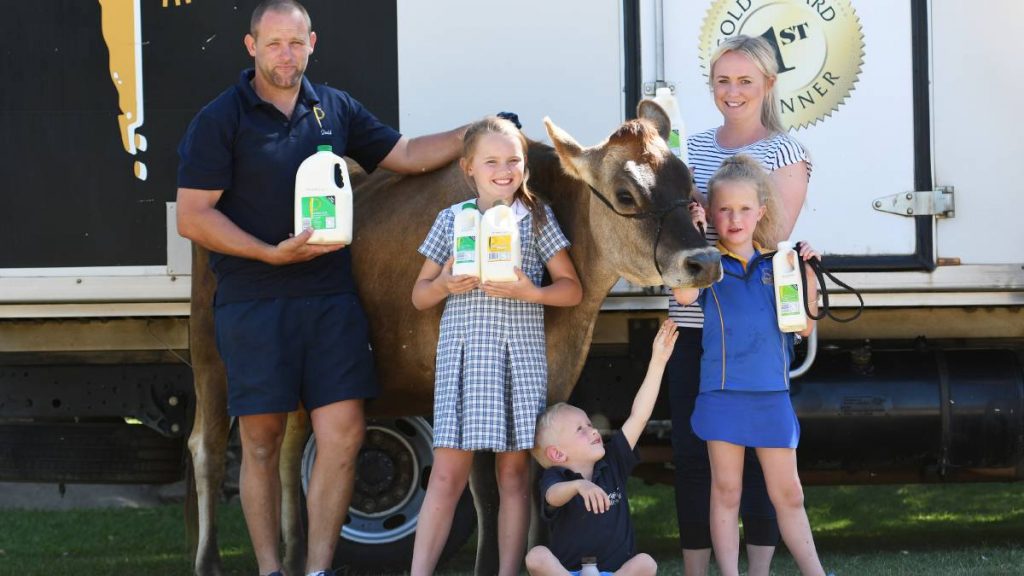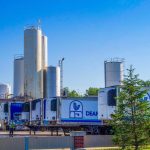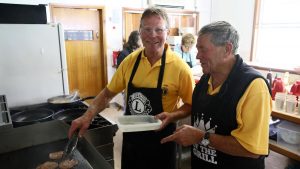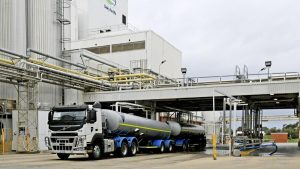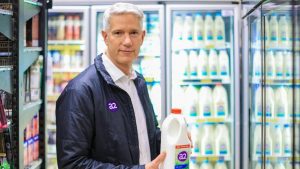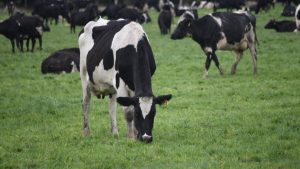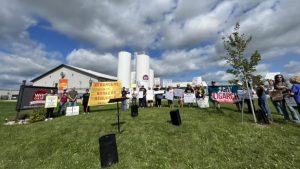
In October 2017 Todd and Sarah, with his parents Brian and Vicki Wilson, bought local processor Peel Valley Milk.
Now they’re setting their own prices and sharing quality Jersey products across the region and looking towards a bright future.
Todd and Sarah are the fifth generation to milk registered Jersey cattle and they’re continuing the successful Shirlinn stud started by Todd’s grandparents Lindsay and Shirley Wilson in 1969.
“Milking Jerseys was bred into me,” Todd, 33, said.
He always wanted to work on the farm and continue a century-old family tradition, but the low milk price paid by big processors had him second-guessing the future.
“I sat down with Dad and we said we’re producing a quality product and we need to be paid a better price for it,” Todd said.
They decided to do something about it; they approached Peel Valley Milk and the owner, Malcolm Rose, was keen to sell.
They took over the processor 18 months ago and have built up sales to match production levels that could be handled at the farm.
Every drop of milk produced at the farm is developed into a Peel Valley Milk product and sold locally and into Newcastle and surrounding areas.
Peel Valley Milk was already 100 per cent Jersey. Mr Rose had started the plant 16 years earlier, doing 100-litre batches at a time. He had built that up to around 10,000 litres a week and the Wilsons have now grown to between 18,000 and 20,000 litres a week, all sourced from their farm.
Todd admits it was “a massive risk” but says they had little choice.
“The decision was sort-of made for us by continued below-par prices paid by the bigger processors,” he said.
“I’d had enough of doing what they told us and taking the price they told us we had to take, and said let’s stop talking and do something about it.”
Although the drought makes it difficult to gauge a true indication of the financial benefits, Todd is sure they’ve made the right move.
“It’s been a really good move for us,” he said. “I’d hate to think about the decisions we would have had to make if we didn’t have Peel Valley Milk to pay ourselves that bit extra.
“I hope I never see a drought like this again in my lifetime. We can’t control the weather but we made the decision to buy Peel Valley Milk so we could control the amount we get paid for our milk.”
Peel Valley Milk produces reduced fat milk, different lines and brands of full cream milk, unhomogenised old-school milk, cream, double cream and coffee, strawberry and chocolate flavoured milks. The products are sold through supermarkets, corner stores and to a growing coffee shop market.
“We’re selling a premium, high-quality product and we’re not into price wars under any circumstances,” Todd said.
“Sometimes it’s a challenge to negotiate with supermarkets when it’s time to put up prices, but we’ve been able to get it done.”
Todd would like other farmers to experience similar price benefits. “We would like to see the rest of the milk market improve,” he said. “Coles and Woolworths have lifted their home brand milk by 10 cents but I don’t think that’s anywhere near good enough. How much of that goes to the farmer?
“I’d like to see all dairy products rise significantly so we get away from price wars and sell our milk for what it’s worth.”
The farm’s milk is tested at an average of 5 per cent butter fat and 4pc protein and the cows average 23 litres per day, adding up to delicious tasting fresh milk.
“People love the Jersey milk, that’s for sure,” Todd said. “Being local helps but being Jersey is a big selling point. People love the taste and creaminess.
“It has a different taste and people says it’s what milk tasted like in the good old days. It’s extra creamy; if you used another breed it would have a different taste. I love it, though I guess I’m a little bit biased.”
The farm and processing plant are self-sufficient but there is room to grow. “We’re working to improve flavours at the moment and look at new things,” Todd said.
“We’d love to be in a position to help other farmers by purchasing some of their milk at a better, consistently higher price. They would be Jersey farmers; that’s something we market. It’s been a very good move for us and all possibilities are open for the future.”
The dairy farm remains a true family affair with three generations working to make a top-quality product.
